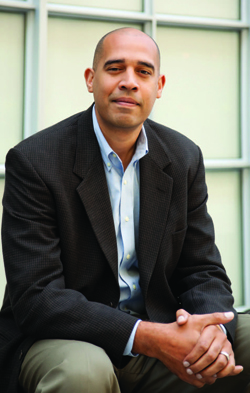Campus News
Alumni in Profile / Stephen Abreu — At the intersection of business and science
Stephen Abreu earned a bachelors in biochemestry and a masters in molecular biology from Kresge College. Today he helps science move from the lab into doctors’ hands.

One day, stem-cell transplants may allow patients’ bodies to secrete insulin on their own, rendering insulin shots for diabetics obsolete.
If and when that happens, one of the people on the path to that pioneering treatment will be Stephen Abreu, who received his bachelor’s degree in biochemistry and his master’s in molecular biology from Kresge College in 1999 and 2003, respectively.
Abreu is an industry contracts manager for UC San Francisco’s famed Diabetes Center and Immune Tolerance Network, where his job places him at the intersection of business and science.
The 6-foot-5 Abreu took a purposeful but zigzagging path to a job he envisioned more than a decade ago. Born into a working-class family, he came to UCSC on a $10,000 Academic Achievement Award created by then-chancellor Karl Pister. Intelligent but slightly adrift, the young man played basketball for UCSC’s men’s varsity team, chased girls, and worked at fast-food restaurants to make ends meet.
“While I loved science, I wasn’t the best student I could be,” he admits.
Then, Abreu met molecular biology professor Barry Bowman. Seeing the potential in the skinny, bright undergrad, Bowman helped him nab a grant from the Minority Biomedical Research Support program, administered by the National Institutes of Health.
The grant allowed Abreu to leave behind his fast-food jobs for work in Bowman’s lab. Out of that grew a passion for science and the first glimmers of his life’s work.
In the late 1990s, the dot-com world was booming and Abreu was fascinated by the multi-million-dollar contracts being hatched between business and science. After graduation he went to work on Wall Street at a big investment firm. He spent two years in that fast-paced, cutthroat environment.
“Then I understood what money meant,” he says.
Abreu returned to UCSC and got his master’s degree working with calcium transport proteins, then earned his law degree at UC Davis, followed by a stint at a big legal firm in San Francisco.
Abreu said he is exactly where he wants to be now: helping science move from the lab into doctors’ hands. He helped close the $20 million deal that has UCSF scientists working with Novocell of San Diego to develop a stem-cell therapy for diabetes.
But Abreu, who is of Afro-Caribbean descent, hasn’t forgotten the role education played in his life. He is on UCSC’s Alumni Council, and has worked as an advocate for disadvantaged youth who want to get into law school.
“UCSC was really a formative place,” says the recently married Abreu. “It was a place where I could find myself, where I could find my own way.